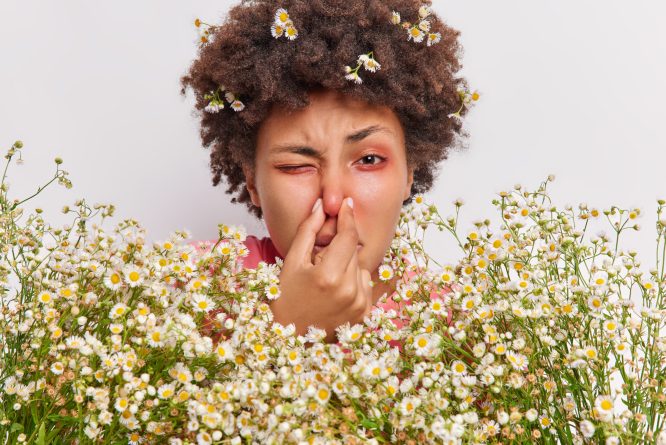Fear not, fellow snifflers! This article is your arsenal for conquering springtime allergies and reclaiming your outdoor bliss.
Common Springtime Allergens
Spring has sprung! Birds are chirping, flowers are blooming, and the sun is shining. However, for many of us, this beautiful time of year brings not just renewal, but also a resurgence of allergy symptoms.
Before we dive into battle, let’s identify the culprits. Pollen is the primary antagonist in this springtime drama. Trees, grasses, and weeds release pollen particles to reproduce, and unfortunately, these tiny trespassers irritate our nasal passages, triggering allergy symptoms like runny or stuffy nose, itchy or watery eyes, sneezing, coughing, and congestion.
Building Your Defense: Effective Allergy Relief Strategies
-
Medicate Wisely: Over-the-counter (OTC) medications are your first line of defense. Antihistamines like loratadine (Claritin) or cetirizine (Zyrtec) block histamine, the chemical released during an allergic reaction, reducing symptoms like itching and sneezing. Nasal corticosteroids, such as fluticasone (Flonase) or budesonide (Rhinocort), are another option, reducing inflammation in the nasal passages. Decongestants like pseudoephedrine (Sudafed) can help with stuffiness, but be mindful of potential side effects like drowsiness. Remember, consult your doctor before starting any new medication.
-
Become a Pollen Blocker: Minimize your exposure to allergens! Keep windows closed during high pollen counts (usually mornings and evenings). Shower after spending time outdoors to remove pollen clinging to your hair and clothes. Change your air filters regularly to trap pollen particles indoors.
-
Saline Solutions: A neti pot or saline nasal rinse can be a lifesaver. This simple practice involves flushing your nasal passages with a saltwater solution, effectively removing mucus and allergens. It’s a drug-free way to decongest and soothe irritation.
-
Natural Allies: Certain natural remedies may offer relief. Local honey may help reduce allergy symptoms, although research is ongoing. Quercetin, a flavonoid found in fruits and vegetables like apples and onions, may have anti-inflammatory properties that can help stabilize mast cells, which release histamine. However, speak to your doctor before incorporating these into your routine.
-
Long-Term Solutions: For persistent allergies, consider allergy shots (immunotherapy). This involves receiving gradually increasing doses of the allergen over time, desensitizing your body and reducing its reaction.
Living Your Best Sneeze-Free Life
By implementing these strategies, you can significantly reduce allergy symptoms and embrace the joys of spring. Here are some bonus tips:
- Track Pollen Counts: Many weather websites and apps provide daily pollen forecasts. Plan outdoor activities for low pollen count days.
- Dress Strategically: Wear sunglasses to shield your eyes from pollen, and opt for a hat to prevent pollen from landing in your hair.
- Befriend a Dehumidifier: If you struggle with allergies at night, a dehumidifier can help reduce mold and mildew growth, which can worsen allergy symptoms.
Remember, if your allergies are severe or don’t respond well to these methods, consult your doctor. With the right approach, you can conquer springtime allergies and enjoy the beauty of the season, sniffle-free!
![NL Wordmark [Gradient] NL Wordmark [Gradient]](https://www.nextlevelurgentcare.com/wp-content/uploads/elementor/thumbs/NL-Wordmark-Gradient-7fm1iv6f0zylwqrxpy8kifrnrzsluqzzzofvqvs6smo.png)
